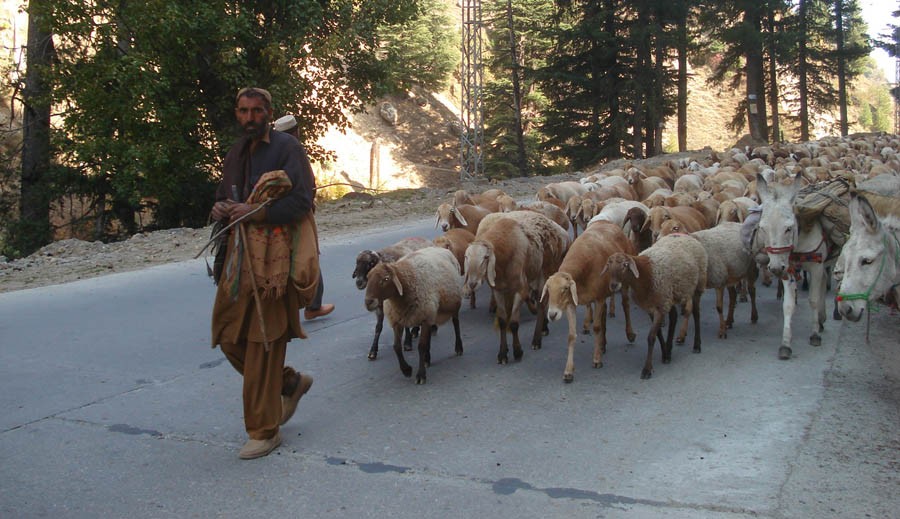
Tagging along the shepherds in Naran, and exploring their way of life in a challenging enivonment…

As shepherds passed by with their herds of goats, during my visit to the scenic valley of Naran, my friend quoted a verse in Urdu about them:
Khanabadosho ki Khuda khud karta hai khana saamani;
Har roz nai manzil, naya dana, naya pani.
Tempted by this very verse, I decided to follow their trail.
Known as Bakarwals, they are seen on the move in early summer from lowlands to highlands of alpine pastures in the north and vice versa each year, and are said to be the dwellers of picturesque sites living in areas of diverse ecology and climate.
While pulling the vehicle off the road, I had an opportunity to sit alongside the herders, which was an experience on its own. They were resting near a river close to the road. I descended the high road to the riverbank where their livestock was drinking water. I approached an elderly man among them.
It was quite soothing to sit on the bank of the river chatting with Abid, a resident herder of Mansehra. Along with his two sons, he had returned from the uphill pastures and was on his way to the lowlands.
The herd of animals they possessed was the only asset on which their survival depends entirely. "We get milk, yogurt, and other dairy products which constitute our major food items instantly and that also without any expenses," said Abid.
I realised how healthy these herders were as they consumed a pure diet and walked long distances -- hundreds of miles of tough terrain as they ascend or descend mountain slopes while leading their herds of goats and sheep. They move from place to place and are able to adjust to the food and water of different areas -- like in the Urdu verse quoted above.
They put their muscles to task from May onwards, for travelling long distances from planes to higher altitudes. They remain there until winter, and return in early October to the southern parts of Khyber Pakhtunkhwa and Punjab.
It is quite amazing to keep control of a herd of goats or sheep usually comprising 100 to 250 animals. The Bakarwals use a stick in their hand, often whistle and make a particular sound to keep the herd moving along the road.
Awed at how they manage to maintain the numerical strength of the herd, I asked Abid how they do it.
"We have become used to this sort of exercise -- a routine of our daily life. We know our livestock, as a driver knows his vehicle," said Abid, proudly.
I instantly recalled the moment when once passing through a bazaar, a baby sheep had entered a shop and the shopkeeper had kept it. It was a herder’s friend who had been following the trail, and so managed to retrieve the baby sheep.
During my conversation with them, I came to know that they count their animals while taking breaks during their travel. They know each goat and sheep like one knows a family member. They can tell which one is missing or ill. They don’t sell the goats or sheep unless they need money for health treatment or to bear the expenditure of a wedding.
Bakarwals have a couple of donkeys with them for transporting their items of daily use, accompanied by a watchdog of a good breed.
It was great fun to spend some moments with this group of herders. I left them and boarded the vehicle for onward travel. Soon after covering some distance, I saw another convoy of shepherds’ goats. And this herder was using a mobile phone…
I wondered how they managed to charge their mobile phones given that they are always on the move and have no access to electricity. Though they seemed poor and one would assume that they wouldn’t have access to advanced technology, they use solar power to charge phone batteries.
I noticed that some of the goats in the herd had coloured fur. "The coloured goats belong to a friend who has requested us to take them with us: to differentiate them from our animals, a part of their fur was coloured," said Gohar, the leader of the group of herders.
We also met herders in Naran valley during our trek to Dudipatsar Lake.
Bakarwals sell some goats and sheep to pay the owners of pastures, who usually hail from Syed or Sadaat families, for the summer period spent in a particular pasture.
Bakarwals are a common sight in the area. They cover about 25 to 30km a day in intervals to provide resting opportunity to their livestock. They spend the night in places they identify as appropriate and safe. During their cyclic migration to and from green pastures, they face many challenges such as landslides, falling stones, heavy rainfall or attacks by carnivores on their goats or sheep during the journey.